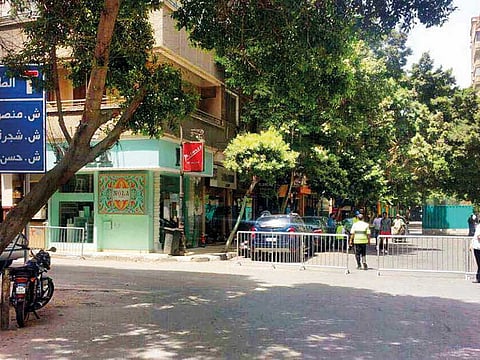Cairo’s Quiet Quarter rails against subway project
Residents of Cairo’s least populated district fear subway extension will bring street peddlers to the area and disrupt the peace

Cairo: Weeks after the work got underway to build a metro station in their Cairo Nile island, residents of Zamalek have shown no sign of let-up in their opposition to the project.
They are pressing ahead with an online campaign, warning that the station will harm their district, home to foreign embassies and cultural institutions.
The angry residents have also gone to court, demanding the station construction halted or relocated.
“We are not snobbish or against national projects. But, this should not come at the expense of inhabitants and their comfort,” said Mahsen Al Shorbagy, a resident of Zamalek.
“We are afraid that our houses will be damaged or even collapse due to the digging works because the soil of the area is soft,” she told Gulf News.
“The metro station will also raise noise levels in our district with its narrow roads. We have started to suffer from disturbances after they closed several streets in the district and made traffic detours weeks ago to prepare for the digging works. It’s a nightmare for all inhabitants of Zamalek and lovers of beauty.”
The controversial station is part of a new stretch of the Cairo subway system planned to run from Imbaba, north-west of the Egyptian capital, to the Cairo airport.
The subway system, which was built in the 1980s, transports nearly 4 million people daily on its existing two lines.
Established in the 19th century, Zamalek is known as the “Quiet Quarter” due to its tree-lined routes and low population density, a rarity in the heavily populated Egyptian capital.
Nearly 20,000 people are residing in Zamalek, according to official figures.
Tharwat Shawqi, a gallery manager in Zamalek.
“This calm will certainly become history soon,” Tharwat Shawqi, a gallery manager in the area, said.
“The new station will draw street vendors and beggars, as is already the case around other metro stations. I can’t understand why the government insists on spoiling everything which is beautiful. Zamalek has long been an attraction for art lovers due to its museums and historic buildings,” he told this newspaper.
“The noise and overcrowding that will come along with the station will destroy Zamalek personality. The best solution to this problem is to integrate the Zamalek station into the Kit Kat station,” Shawqi added, referring to a subway station planned in the working-class neighbourhood of Imbaba.
Over recent weeks, residents of Zamalek have placed several prepaid complaints in major Egyptian newspapers, urging senior state officials to step in and stop building the station in their quarter, where Egypt’s late music icons Om Kolthum and Abdul Halim Hafez lived.
Government officials have defended their plan to build the metro station in Zamalek.
“Specifying the locations of the metro stations is determined by factors of population and traffic density. Zamalek has in recent years witnessed an increase in car and pedestrian traffic, a matter that makes the construction of a metro station there necessary,” head of the state-run National Authority for Tunnels, Tareq Jamal Al Deen, said.
The Zamalek station is planned to serve more than 1 million people living and visiting the area, according to Jamal Al Deen.
“There are 53 embassies and consulates in Zamalek. The number of people visiting these missions is higher than the number of the Zamalek population. In addition, there are five colleges, 16 banks, six hotels and five sports clubs in Zamalek,” Jamal Al Deen said in media remarks.
He added that stretching the subway service to Zamalek will improve the environment quality in the area by drastically cutting the present bus journeys there.
An Egyptian-French consortium implementing the third line of the metro has also sought to dispel fears of Zamalek residents.
The alliance officials have ruled out the possibility of relocating the Zamalek station, citing safety reasons.
They explained that such relocation will increase risks in fire emergencies. “In case of cancelling the [Zamalek] station, the distance running under the Nile between the two other stations will reach 2,200 metres instead of the planned 1,200 metres in violation of relevant world standards,” the consortium said at a recent presence conference.
Nine-month works started in late July to relocate Zamalek’s water, gas and electricity supply lines from the planned route of the metro.
“We fully understand concerns of residents of Zamalek, being one of the distinguished areas in Cairo,” said Hesham Khashba, the chief of the Western Cairo District to which Zamalek is affiliated. “The area will continue to enjoy its quietude and security. The National Underground Metro project will not damage its distinction or its historical value,” Khashba added in a press statement.
“The digging operations will be carried out according to thorough studies conducted by the engineering committee in charge of the project.”



